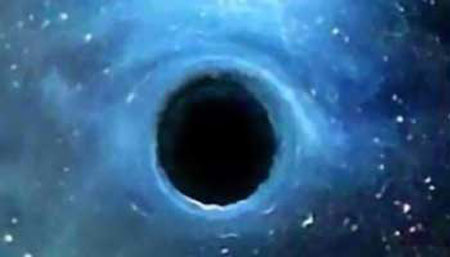Black holes blow stronger winds than previously thought: study
Black holes can release more energy into the galaxies they live in than previously thought, a new study said Thursday.
 The discovery, published in the U.S. journal Science, will help astronomers better model the evolution of black holes over time, and it will also help them better understand how these mysterious regions affect their host galaxies. Black holes are places in space where gravity pulls so much that even light cannot get out. Black holes grow when gas in space flows or accretes onto them. The gas inside gets so hot it emits radiation. According to a theory of physics called the Eddington limit, the amount of radiation flowing outward from a black hole cannot exceed a certain limit or it will blow the inflowing gas away. The limit is based on the black hole's mass. However, whether a black hole's kinetic energy, in the form of jets and winds, is controlled by the same limit has been unclear. To shed some light on the matter, scientists led by Roberto Soria of Australia's Curtin University used telescopes to study the outflow of a black hole in galaxy M83 for more than a year. By analyzing the gas flowing into the black hole, they figured out the black hole's weight as less than 100 times that of the Sun. The researchers compared the mass of the black hole with its outgoing kinetic power, which they were able to infer in part by looking at the light around it. The kinetic power flowing out of the black hole was higher than the Eddington limit for a black hole of this mass, the researchers found. These results demonstrate that black holes can "inject more energy into the surrounding medium than would be inferred based on their Eddington limits," the researchers wrote in their paper. "The existence of super-Eddington mechanical power is important for the modeling of jet production mechanisms, as well as the evolution of fast-growing supermassive BHs (black holes) in the early universe, and their effect on their host galaxies," they added. Xinhuanet
The discovery, published in the U.S. journal Science, will help astronomers better model the evolution of black holes over time, and it will also help them better understand how these mysterious regions affect their host galaxies. Black holes are places in space where gravity pulls so much that even light cannot get out. Black holes grow when gas in space flows or accretes onto them. The gas inside gets so hot it emits radiation. According to a theory of physics called the Eddington limit, the amount of radiation flowing outward from a black hole cannot exceed a certain limit or it will blow the inflowing gas away. The limit is based on the black hole's mass. However, whether a black hole's kinetic energy, in the form of jets and winds, is controlled by the same limit has been unclear. To shed some light on the matter, scientists led by Roberto Soria of Australia's Curtin University used telescopes to study the outflow of a black hole in galaxy M83 for more than a year. By analyzing the gas flowing into the black hole, they figured out the black hole's weight as less than 100 times that of the Sun. The researchers compared the mass of the black hole with its outgoing kinetic power, which they were able to infer in part by looking at the light around it. The kinetic power flowing out of the black hole was higher than the Eddington limit for a black hole of this mass, the researchers found. These results demonstrate that black holes can "inject more energy into the surrounding medium than would be inferred based on their Eddington limits," the researchers wrote in their paper. "The existence of super-Eddington mechanical power is important for the modeling of jet production mechanisms, as well as the evolution of fast-growing supermassive BHs (black holes) in the early universe, and their effect on their host galaxies," they added. Xinhuanet
 Thailand to build new bridge to Cambodia
Thailand to build new bridge to Cambodia
 Bulgaria charts new course with Vietnam on President’s upcoming visit: Diplomat
Bulgaria charts new course with Vietnam on President’s upcoming visit: Diplomat
 Seminar seeks ways to boost ASEAN - Latin America connectivity
Seminar seeks ways to boost ASEAN - Latin America connectivity
 Indonesia seeks India's help in health education
Indonesia seeks India's help in health education
 Indonesia named world's most generous country in 2024
Indonesia named world's most generous country in 2024
 Philippines: Over-4m-high floodwaters make thousands of houses submerged
Philippines: Over-4m-high floodwaters make thousands of houses submerged
 Singapore’s public sector records carbon reduction in 2023
Singapore’s public sector records carbon reduction in 2023
 Pressure facing the EU on its growth track
Pressure facing the EU on its growth track
 Efforts boosted to combat transnational organised crime
Efforts boosted to combat transnational organised crime
 Nearly 200 terror suspects arrested in Indonesia in two years
Nearly 200 terror suspects arrested in Indonesia in two years



